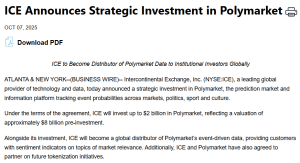Despite hundreds of millions of dollars worth of Strategy purchases by institutional wealth managers overseeing trillions of dollars, its MSTR common stock is languishing 38% below its 52-week high.
Since the end of the second quarter of 2025 when many funds disclosed their purchases, MSTR has lost $8 billion in market cap despite these impressive inflows.
This month, a division of the $1.3 trillion asset manager Northern Trust disclosed $31.6 million in MSTR purchases.
Meanwhile, the $700 million BNC Wealth Management LLC purchased 1,831 MSTR, according to its most recent quarterly report.
California’s State Teachers Retirement System as well as its Public Employees Retirement System disclosed more than $40 million worth of MSTR purchases in their financial disclosure last month.
Vident Advisory LLC bought over $30 million per its August disclosure — as did BLKBRD Asset Management.
Even Canadian retirement investors through Bank of Montreal have purchased MSTR this year.
A division of French asset manager Amundi with $2.4 trillion in assets under management purchased over $300 million worth of MSTR this year.
Institutions are buying as MSTR goes sideways
Other wealth managers purchased MSTR as well, including Rothschild Investment LLC, Summit Financial LLC, SJS Investment Consulting Inc., Mill Creek Capital Advisors LLC, Canal Capital Management LLC, Advisory Services Network LLC, and SeaCrest Wealth Management LLC.
Although real-time reporting isn’t required, all of these funds added MSTR shares in their most recent fiscal reporting quarter.
Norwegian sovereign wealth fund, Norges Bank Investment Management, also owns over $1.1 billion worth of MSTR, including an extra 1.81 million shares that it added this year.
Read more: Michael Saylor says short seller deployed bots to bash MSTR
Meanwhile, Tier 1 institutions like Vanguard, Blackrock, Morgan Stanley, UBS, State Street, Susquehanna, Jane Street, Citadel, and JP Morgan also own millions of shares apiece of MSTR — often for the benefit of their clients, like brokerage customers who purchase their ETFs.
Collectively, these institutions hold tens of billions of dollars worth of MSTR common stock on behalf of their clients.
Protos previously summarized the global web of funds that own MSTR, including Nasdaq 100 index-tracking funds of which MSTR is a constituent.
Unlike most stocks, Michael Saylor’s company benefits from passive, indexation flows.
Indeed, the majority of MSTR ownership is institutional in nature — including index-tracking ETFs and funds for clients seeking Nasdaq 100 exposure via traditional financial entities.
Although MSTR remains a constituent of the Nasdaq 100 and other indices, it unfortunately lost its recent bid to join the most prestigious index, the S&P 500. It hopes to qualify in an upcoming quarterly re-application.
Got a tip? Send us an email securely via Protos Leaks. For more informed news, follow us on X, Bluesky, and Google News, or subscribe to our YouTube channel.
Source: https://protos.com/mstr-down-8b-this-quarter-despite-inflows-from-global-institutions/


